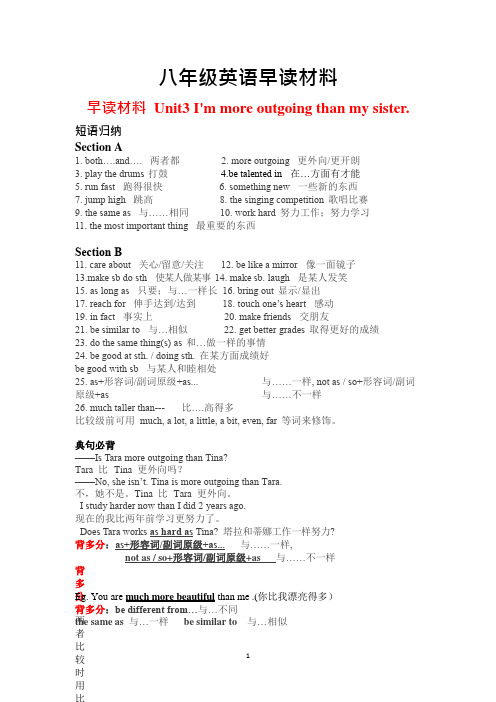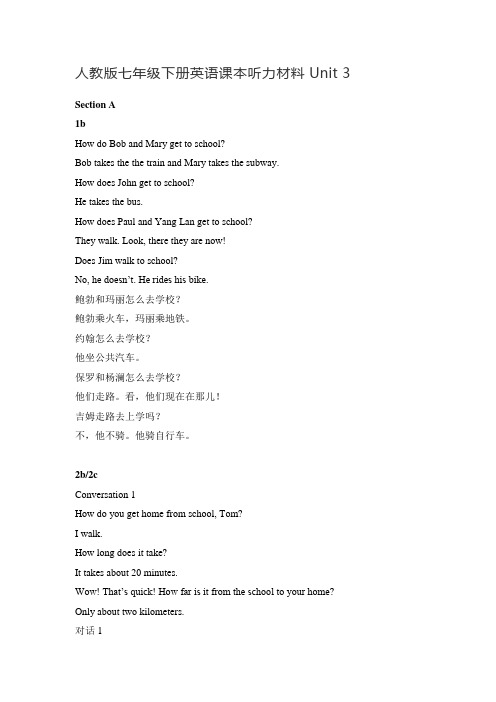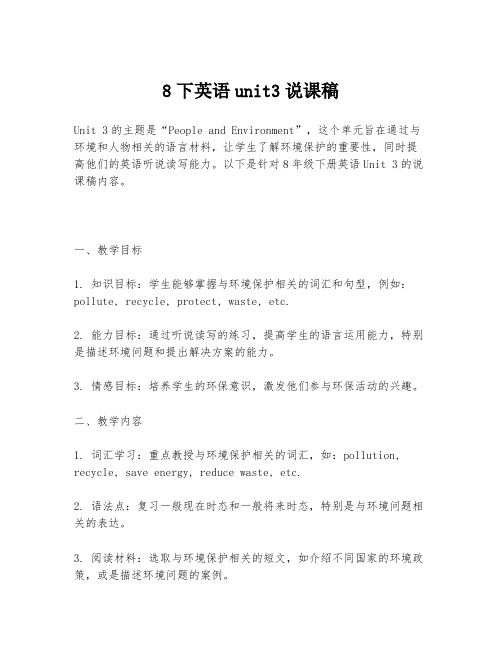学生材料unit3
- 格式:doc
- 大小:30.00 KB
- 文档页数:2

人教版高中英语必修第一册《Unit 3 Sports and Fitness》说课稿一、教材简介《Unit 3 Sports and Fitness》是人教版高中英语必修第一册中的一个单元,本单元的主题为体育和健康,通过讲解体育和健康的相关话题,旨在帮助学生提高英语听、说、读、写的能力,并培养学生的健康意识。
二、教学目标本单元的教学目标主要包括以下几个方面:1.语言知识与技能:–学习掌握有关体育和健康的相关词汇和句型;–通过听、说、读、写等活动提高学生的语言表达能力;–培养学生对体育和健康话题的兴趣。
2.学习策略:–培养学生主动学习的意识,引导学生在学习中运用不同的学习策略;–培养学生的合作学习能力,提高学生与他人合作的能力。
3.情感态度与价值观:–通过介绍体育和健康的好处,培养学生对体育锻炼和健康饮食的积极态度和正确价值观。
三、教学重点与难点1.教学重点:–通过听说读写的活动,提高学生的英语交际能力;–学习掌握关于体育和健康的相关词汇和句型。
2.教学难点:–培养学生在交流中使用学到的词汇和句型的能力;–引导学生对体育和健康话题的反思和思考。
四、教学准备1.教学工具:–投影仪和电脑或者教材原书;–多媒体课件。
2.教学材料:–学生教材《Unit 3 Sports and Fitness》;–多媒体课件;–教师准备好的教案和教学素材。
五、教学过程Step 1 导入新课1.利用多媒体课件呈现关于体育和健康的图片,引发学生对话题的兴趣。
Step 2 自主学习1.让学生阅读教材中与体育和健康相关的文章和短文,理解文章的大意,并且标记出重点词汇和句型。
Step 3 合作学习1.将学生分成小组,让他们合作进行角色扮演,模拟对话,并运用学到的语言知识。
Step 4 拓展学习1.利用多媒体课件播放一段关于体育和健康的视频或音频,让学生进行听力练习,理解并记录关键信息。
Step 5 角色扮演1.分发角色扮演卡片给每个学生,让他们根据卡片上的角色信息进行小组活动,模拟真实情景,锻炼语言表达能力。

八年级单元学习材料Unit3Section A 1a——2dI.重点词组洗餐具do the dishes 倒垃圾take out the rubbish 整理床铺make one’s bed叠衣服fold the clothes 扫地sweep the floor 打扫客厅clean the living room出去吃饭go out for a dinner 去看电影go to the movies 在外面待到很晚stay out late搭车get a rideII. 重点句子1.A:你扫地好吗?B: 可以。
A: Could you please sweep the floor? B: Yes, sure.2. A: 我用用你的电脑好吗?B: 对不起,我要用。
A: Could I use your computer? B: Sorry, I’m going to work on it now.3. 托尼,你能帮忙做几件事吗?Tony, could you please help out with a few things?4. 因为妈妈随时都会买完东西回来。
Because Mom will be back from shopping any minute now.5. 至少能让我看完这个节目吗?Could I at least finish watching this show?6. 不行!我觉得对你来说看两个小时的电视已经够多了!No. I think two hours of TV is enough for you!7. 如果她看到家里乱糟糟会不高兴的。
She won’t be happy if she sees the mess.III.听力材料Section A 1bMom: Peter, we need to clean the house. Your grandma is coming over at seven.皮特,我们需要打扫房子了,你奶奶七点钟过来Peter: Sure, but I need to do my homework first. 当然,但是我需要先做功课Mom: OK. Then after you finish your homework, let’s clean up the kitchen. I can do the dishes and sweep the floor. Could you please take out the rubbish? 可以。

1 八年级英语早读材料早读材料 Unit3 I'm more outgoing than my sister. 短语归纳Section A1. both….and…. 两者都2. more outgoing 更外向/更开朗3. play the drums 打鼓4.be talented in 在…方面有才能5. run fast 跑得很快6. something new 一些新的东西7. jump high 跳高 8. the singing competition 歌唱比赛9. the same as 与……相同 10. work hard 努力工作;努力学习11. the most important thing 最重要的东西Section B11. care about 关心/留意/关注 12. be like a mirror 像一面镜子13.make sb do sth 使某人做某事 14. make sb. laugh 是某人发笑15. as long as 只要;与…一样长 16. bring out 显示/显出17. reach for 伸手达到/达到 18. touch one’s heart 感动19. in fact 事实上 20. make friends 交朋友21. be similar to 与…相似 22. get better grades 取得更好的成绩23. do the same thing(s) as 和…做一样的事情24. be good at sth. / doing sth. 在某方面成绩好be good with sb 与某人和睦相处25. as+形容词/副词原级+as... 与……一样, not as / so+形容词/副词原级+as 与……不一样26. much taller than --- 比….高得多比较级前可用 much, a lot, a little, a bit, even, far 等词来修饰。

Unit 3 Why I TeachPeter G. BeidlerEvery teacher probably asks himself time and again: What are the reasons for choosing teaching as a career? Do the rewards teaching outweigh the trying comments? Answering these questions is not a simple task. Let's see what the author says.Why do you teach? My friend asked the question when I told him that I didn't want to be considered for an administrative position. He was puzzled that I did not want what was obviously a "step up" toward what all Americans are taught to want when they grow up: money and power.Certainly I don't teach because teaching is easy for me. Teaching is the most difficult of the various ways I have attempted to earn my living: mechanic, carpenter, writer. For me, teaching is a red-eye, sweaty-palm, sinking-stomach profession. Red-eye, because I never feel ready to teach no matter how late I stay up preparing. Sweaty-palm, because I'm always nervous before I enter the classroom, sure that I will be found out for the fool that I am. Sinking-stomach, because I leave the classroom an hour later convinced that I was even more boring than usual.Nor do I teach because I think I know answers, or because I have knowledge I feel compelled to share. Sometimes I am amazed that my students actually take notes on what I say in class!Why, then, do I teach?I teach because I like the pace of the academic calendar. June, July, and August offer an opportunity for reflection, research and writing.I teach because teaching is a profession built on change. When the material is the same, I change —— and, more important, my students change.I teach because I like the freedom to make my own mistakes, to learn my own lessons, to stimulate myself and my students. As a teacher, I'm my own boss. If I want my freshmen to learn to write by creating their own textbook, who is to say I can't? Such courses may be huge failures, but we can all learn from failures.I teach because I like to ask questions that students must struggle to answer. The world is full of right answers to bad questions. While teaching, I sometimes find good questions.I teach because I enjoy finding ways of getting myself and my students out of the ivory tower and into the real world. I once taught a course called "Self-Reliance in a Technological Society." My 15 students read Emerson, Thoreau, and Huxley. They kept diaries. They wrote term papers.But we also set up a corporation, borrowed money, purchased a run-down house and practiced self-reliance by renovating it. At the end of the semester, we would the house, repaid our loan, paid or taxes, and distributed the profits among the group.So teaching gives me pace, and variety, and challenge, and the opportunity to keep on learning.I have left out, however, the most important reasons why I teach.One is Vicky. My first doctoral student, Vicky was an energetic student who labored at her dissertation on a little-known 14th century poet. She wrote articles and sent them off to learned journals. She did it all herself, with an occasional nudge from me. But I was there when she finished her dissertation, learned that her articles were accepted, got a job and won a fellowship to Harvard working on a book developing ideas she'd first had as my student.Another reason is George, who started as an engineering student, then switched to English because he decided he liked people better than things.There is Jeanne, who left college, but was brought back by her classmates because they wanted her to see the end of the self-reliance house project. I was here when she came back. I was there when she told me that she later became interested in the urban poor and went on to become a civil rights lawyer.There is Jacqui, a cleaning woman who knows more by intuition than most of us learn by analysis. Jacqui has decided to finish high school and go to college.These are the real reasons I teach, these people who grow and change in front of me. Being a teacher is being present at the creation, when the clay begins to breathe.A "promotion" out of teaching would give me money and power. But I have money. I get paid to do what I enjoy: reading, talking with people, and asking question like, "What is the point of being rich?"And I have power. I have the power to nudge, to fan sparks, to suggest books, to point out a pathway. What other power matters?But teaching offers something besides money and power: it offers love.Not only the love of learning and of books and ideas, but also the love that a teacher feels for that rare student who walks into a teacher's life and begins to breathe. Perhaps love is the wrong word: magic might be better.I teach because, being around people who are beginning to breathe, I occasionally find myself catching my breath with them.我为何教书你为什么教书呢?当我告诉我的朋友我不想做任何行政职务时,他向我提出了这个问题。

人教版七年级下册英语课本听力材料Unit 3Section A1bHow do Bob and Mary get to school?Bob takes the the train and Mary takes the subway.How does John get to school?He takes the bus.How does Paul and Yang Lan get to school?They walk. Look, there they are now!Does Jim walk to school?No, he doesn’t. He rides his bike.鲍勃和玛丽怎么去学校?鲍勃乘火车,玛丽乘地铁。
约翰怎么去学校?他坐公共汽车。
保罗和杨澜怎么去学校?他们走路。
看,他们现在在那儿!吉姆走路去上学吗?不,他不骑。
他骑自行车。
2b/2cConversation 1How do you get home from school, Tom?I walk.How long does it take?It takes about 20 minutes.Wow! That’s quick! How far is it from the school to your home? Only about two kilometers.对话1汤姆,你放学怎么回家?我走路。
需要多长时间?大约需要20分钟。
哇!太快了!从学校到你家有多远?大约只有两公里。
Conversation 2How do you get home from school, Jane?I take the bus.How long does it take?Oh, about one hour and 30 minutes. Wow! That’s a long time!Yes , I only go home on weekends.How far is it from your home to school? It’s about 60 kilometers.对话2简,你怎么从学校回家的?我坐公共汽车。

8下英语unit3说课稿Unit 3的主题是“People and Environment”,这个单元旨在通过与环境和人物相关的语言材料,让学生了解环境保护的重要性,同时提高他们的英语听说读写能力。
以下是针对8年级下册英语Unit 3的说课稿内容。
一、教学目标1. 知识目标:学生能够掌握与环境保护相关的词汇和句型,例如:pollute, recycle, protect, waste, etc.2. 能力目标:通过听说读写的练习,提高学生的语言运用能力,特别是描述环境问题和提出解决方案的能力。
3. 情感目标:培养学生的环保意识,激发他们参与环保活动的兴趣。
二、教学内容1. 词汇学习:重点教授与环境保护相关的词汇,如:pollution, recycle, save energy, reduce waste, etc.2. 语法点:复习一般现在时态和一般将来时态,特别是与环境问题相关的表达。
3. 阅读材料:选取与环境保护相关的短文,如介绍不同国家的环境政策,或是描述环境问题的案例。
4. 听力练习:播放有关环境保护的听力材料,让学生练习听力理解并回答问题。
5. 口语练习:组织角色扮演或小组讨论,让学生用英语表达对环境问题的看法和解决方案。
6. 写作训练:指导学生写一篇关于环境保护的短文或倡议书。
三、教学方法1. 情景教学法:通过设置与环境保护相关的情景,让学生在实际语境中学习和使用语言。
2. 任务型教学法:设计一系列与环境保护相关的任务,如调查、报告、倡议等,让学生在完成任务的过程中学习语言。
3. 合作学习:鼓励学生进行小组合作,共同探讨环境问题,提高团队协作能力。
四、教学过程1. 导入新课:通过展示环境污染的图片或视频,激发学生对环境保护的兴趣。
2. 词汇教学:通过图片、例句和游戏等方式,教授新词汇。
3. 语法点讲解:结合例句,讲解一般现在时和一般将来时态的用法。
4. 阅读训练:指导学生阅读有关环境保护的短文,理解文章大意,并回答相关问题。
九年级上册第3单元听力测试材料第一节听短对话, 选出最佳答案。
每段对话只读两遍1.W:I can’t s ee any dictionaries.Could you please tell me where they are?M:Sure,they’re on the second floor.Question. What’s the girl looking for?2.W:I often hang o ut with my friends and after that we can eat at Qiu’s Restaurant.It’s really a good place to eat outside.M:Yes.Its food is delicious and cheap.Question. How does the man like the food at Qiu’s restaurant?3.W:Mr.Wang walks to work every day.Does he live near the TV station?M:Yes.His home is just next to the TV station.Question. Where does Mr.Wang live?4.W:I really don’t know where we can go.We must get some information about the town.M:You’re right.We should buy a map.Question. What are they going to buy?5.W:Excuse me,could you tell me where the drugstore is?M:It’s between the clothes store and the shoe store.Question. Where’s the shoe store?6.W:Can I help you?M:Yes.I need a stamp.I want to send a letter.Question. What does the man want to do?7.M:Let’s go out to have lunch.W:Sounds good!What would you like to eat?M:I’d like noodles.Question. What does the man want to eat for lunch?8:W:Wow!How fascinating these oak bowls are?M:I’ve been collecting them for 11 years.Question. How long has the man been collecting oak bowls?第二节听下面的5段长对话或独白,选择正确的答案。
For personal use only in study and research; not forcommercial use年级单元学习材料Unit3莃八ection A 1a——2d羈S薈I .重点词组do the dishes 倒垃圾take out the rubbish 整理床铺make one’s bed蒆洗餐具fold the clothes 扫地sweep the floor 打扫客厅clean the living room袀叠衣服羀出去吃饭go out for a dinner 去看电影go to the movies 在外面待到很晚stay out lateget a ride蚆搭车袅II. 重点句子薀1.A:你扫地好吗?B: 可以。
A: Could you please sweep the floor? B: Yes, sure.螇2. A: 我用用你的电脑好吗?B: 对不起,我要用。
袅A: Could I use your computer? B: Sorry, I ’m going to work on it now.芄3. 托尼,你能帮忙做几件事吗?Tony, could you please help out with a few things?莀4. 因为妈妈随时都会买完东西回来。
Because Mom will be back from shopping any minute now.衿5. 至少能让我看完这个节目吗?Could I at least finish watching this show?膇6. 不行!我觉得对你来说看两个小时的电视已经够多了!螄No. I think two hours of TV is enough for you!肁7. 如果她看到家里乱糟糟会不高兴的。
She won’t be happy if she sees the mess.袀III .听力材料S ection A 1b芅膃Mom: Peter, we need to clean the house. Your grandma is coming over at seven. 皮特,我们需要来过打扫房子了,你奶奶七点钟袁Peter: Sure, but I need to do my homework first. 当然,但是我需要先做功课蚇Mom: OK. Then after you finish your homework, let ’s clean up the kitchen. I can do the dishes and sweep the floor. Could you please take out the rubbish? 可以。
Forpersonaluseonlyinstudyandresearch;notforcommercialuse八?年级单元学习材料Unit3SectionA1a——2dI.重点词组洗餐具dothedishes倒垃圾takeouttherubbish整理床铺makeone’sbed叠衣服foldtheclothes扫地sweepthefloor打扫客厅cleanthelivingroom出去吃饭搭车II.1.A2.A:3.4.5.6.7.III点钟过来我必SectionA2a,2bPeter:Hey,Dad?你好,爸爸Dad:Yes?什么事?Peter:CouldIgooutfordinnerwithmyfriendstonight?今晚我可以和朋友一起出去吃晚饭吗?Dad:Sure,thatshouldbeOK.当然,听上去应该可以Peter:CouldIgotothemoviesafterthat?Myfriendssaidthenewactionmovieisreallygood.此后我可以去看电影吗?我朋友说这部新的动作片真的很好呢Dad:Iguessso.Butdon’tstayoutlate.我猜是,但是别待得太晚了Peter:CouldIstayoutuntileleven?Wemightgetsomethingtodrinkafterthemovie.我可以待到11点吗?我们看完电影可以弄点喝的Dad:No,you can’t.Youhaveabasketballgametomorrow,remember?Youneedtohaveagoodrest.不,你不能。
你明天有一场篮球赛,记得吗?你需要好好休息Peter:Oh,yeah.Well,couldyougivemearidetotownnow?IfItakeabus,I’llbelate.奥,是的,你能现在开车捎我到市区吗?如果我乘公交车去,我会迟到的。
五年级第三单元英语资料- 经管营销五班级unit 3学习资料一、四会词(要求:认读5遍,口译,会默写和听写)(1)衣服类:① 四班级旧词:cap 帽子T-shirt T恤衫shirt衬衣sweater毛线衫,厚运动衫shorts 短裤skirt 短裙dress 连衣裙,女服jeans 牛仔裤socks 短袜shoes 鞋子trainers 运动鞋②生词:tie 领带cardigan 开襟毛衣blazer 运动上衣blouse 女士衬衣trousers 长裤jacket夹克uniform制服school uniform校服(2)chain 链子need 需要poor 可怜的poster 海报uniform 制服way路boy 男孩dear 友爱的girl女孩stupid愚蠢的new 新的photo 照片water 水wear 穿着、戴着yours你的,你们的match 找相像或相配物catch捉住,抓住have1、有2、吃3、喝(3)red 红色pink 粉色white 白色black 黑色grey灰色blue 蓝色green绿色yellow黄色orange橙色purple紫色brown棕色二.三会词(要求:认读5遍,口译):①lesson功课,课English lesson 英语课chant 歌谣game嬉戏video视频story 故事(复数stories)teacher 老师speak说(现在分词speaking)child 孩子children 孩子(复数)hungry 饿的idea 办法hour 小时week 星期next 下一个must 必需later 之后think认为,想boring无趣的all 全部,都look看;看起来look nice看起来很美丽nice ①美丽的②心地好的③舒适的④兴奋的chips 薯条crisps 薯片Liverpool利物浦packet 包、袋pocket 口袋②soft drinks 软饮料chocolate bar巧克力条phone box 电话亭look at…看……look for… 查找…… look after… 照看……this year 今年every week 每周one can of soft drinks 一罐软饮料six cans of soft drinks 六罐软饮料one packet of crisps一包薯片four packets of crisps 四包薯片三、四会句(将划线部分替换仿写三句;要求认读5遍,口译,背诵(英,英,汉),会默写和听写)① 我特别喜爱苹果。
Unit 3 The Generation Gap
班级姓名
I:Read T ext A carefully and find these useful expressions in the text.
1. 发短信
2. 扩大代沟
3.(汽车)后座
4. 就...作评论
5. 翻白眼
6. 后视镜
7. 社交圈子
8. 广泛的社会变化
9. 虚拟生活
10. 加速这些趋势
11. 社会影响
12. 时区
13. 时间紧迫/不够的
14. 办事,跑腿
15.耗时,费时
16.文化变迁
17. 不了解最新情况的
18.即时短信
19.临床心理学家
20. 促使,推动
21. 电信公司
22. 不让… 接近,防范
23. 将… 蒙在鼓里
24.警告某人小心
25. 避免亲近
26. 上速成班
Ⅱ. Spot Dictation:
Listen to the passage and fill in the blanks with the missing words.
A generation gap describes vast (1)between a younger generation and their elders. The term first (2)prominence in Western countries during the 1960s. There were major differences between the young people and their parents (3)musical tastes, fashion, drug use, and politics. Several examples of generational differences were prominent (4). Rock music and soul music, (5) was mostly detested by their elders.
(6) on young males was frequently seen as a shocking act of rebellion society by their parents. (7) against the Vietnam War on American college campuses contrasted sharply with the universal (8) for World War II that their parents had experienced. Many youths “dropped out”into the hippie counterculture (嬉皮士反文化潮流). The term “generation gap”is (9) today, as generational differences and generational identity are now (10) in Western society than during the 1960s.。